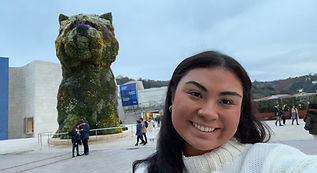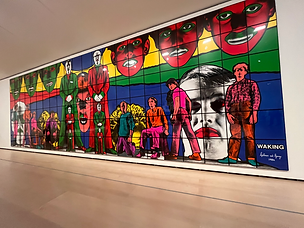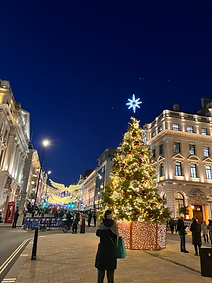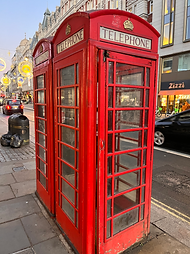
ISABELLE RUA PARRA | CLEMSON UNIVERSITY
SPANISH, MODERN LANGUAGES

STUDY ABROAD
Logroño, Spain
Bilbao, Spain
Bordeaux, France

Plaza del Mercado


Paseo Príncipe de Vergara

Puppy


Guggenheim Museum
Guggenheim Museum
My experience with my target language comes from my home. My parents are from Colombia, South America and I grew up speaking both English and Spanish. Although I learned to speak and write at a young age, I learned through listening and conversation and lacked experience with the grammar aspect of the language.
When I first started the process to study abroad, I remember being nervous about the dialect difference from what I was used to with my family. More specifically, I applied for the USAC program in Bilbao, Spain in the Fall of 2022. One of my main goals for being in Spain was to use Spanish completely, even when I was with my roommates. I wanted to get accustomed to using my target language. Another goal was to learn more about the culture in Bilbao. I realized I had a lot to learn when I got there. When I met my landlord, I had asked her about a trash can as there was not one in the apartment and she was not familiar with the term I used for it. I knew I had to familiarize myself with terms that I may not be used to as I was in a new place.
A big cultural difference to me was that many restaurants closed after lunch, usually after 3 pm until around 6-8 pm. Many people believe the shops and restaurants close for siesta. The word 'siesta' comes from Roman times, 'sexta' in Latin, when they would count the hours of the day based on the sun raise. 'Sexta' was around noon when workers would take a break from being outside to go in and rest. The warm climate in Spain also made for field workers to take a midday break for lunch until the heat dropped before the industrial revolution. Nowadays, the real reason for businesses closing has more to do with less foot traffic during these times. In Spain, lunch is the most important meal of the day for most people. Between 2 and 3 pm, everyone that has a break, is usually eating a large lunch during these times and not out shopping. This pertains to students as well; the school hours are normally 9 am to 5 pm with a lunch break from 1-3 pm. Some children go home during this time to eat with family if the school doesn't have a cafeteria. The shops don't immediately reopen after lunch because people are still getting off work and parents are doing things around the house before their kids come home from school. Due to this, many business owners choose to close during these times. Something to keep in mind is that while this is common for smaller cities, in larger cities many businesses don't close because it is busy enough to stay open and pay employees. Overall, it is up to the business on what time they close or if they stay open. Restaurants usually will close after lunch and not reopen until dinner around 8 pm so they have time to rest as well as get ready for the night shift, cafes may close before lunch from 2-5pm since they may not serve lunch meals, tapas (a small appetizer such as a sandwich or small portion of food) bars may not close at all during the day since it's common to grab one whenever, and local shops may close since people aren't shopping until later on. This was a culture shock to me because I had been used to a small lunch and a large dinner and the break times I was given at work were usually only enough for a quick bite to eat. At my current job as a waitress, I don't get a break at all. Here, I was told people rarely ate dinner, if they did go out to eat, they would mainly grab 'tapas' and 'pintxos' (also an appetizer) with a glass of wine to hold them over until the next day. Another shock for me was how almost everything was closed on Sundays. Many people believe that businesses are closed on Sundays because it is a day of rest, to spend time with family, and to go to Church, but it goes beyond that. Spain has Sunday trading laws, along with some other countries, that limits how long and how often businesses can open on Sundays. Businesses have the choice of what days and times they open, but it has to be during the framework of the law depending on the regional government. In many cities and towns, businesses can open on one Sunday of the month, during busy holiday seasons, or sales periods. This law also depends on the part of Spain and the type of business. Some establishments such as hospitality, small convenience stores, pharmacies, and more are exempt to this law as well as, some tourist areas. At first, it was hard to get used to because I would push off grocery shopping on Saturday thinking I could go the next day and then I would realize the grocery store was closed and would have to wait until Monday. I quickly adapted to going before or ordering food from a restaurant that was opened. It wasn't a big deal at all, just different. Although some local businesses are closed in the U.S. on Sundays, most chain retail stores, restaurants, and grocery stores are opened; it was different seeing how quiet the town was that day.
Although I had many memorable and meaningful experiences, there are three that stick out to me the most. I was able to visit Bordeaux, France with my roommates in October for a weekend and I had the most amazing time. I thoroughly enjoyed practicing a little French to communicate with the people there. Some people would speak to us in English the second they realized we had to use a translator. I also got to see some beautiful architecture, as well as visit some landmarks (pictured). Another memorable experience for me was being able to visit London, England. Three of my cousins were born and raised there and I had never gotten the chance to meet them until December. I heard many stories about them growing up and I had always wanted to meet them. I am so thankful for my time abroad for giving me the opportunity for this experience. I got to visit the London Eye, Big Ben, and the Winter Wonderland festival with my cousin, Luisa, and her friends. Last, but not least, i was able to go to Logroño, Spain to visit a daughter of one of my mom's cousins who she grew up super close to in November. I met her once when I was very young when I was visiting Colombia, but many years had passed and I had not seen her since. It was special being able to reconnect, as well as being able to see the city with her and her husband. I feel very lucky to have been able to visit these three places with special people.
When people would hear me talk, many would immediately ask me if I spoke 'Castellano' (Spanish). When I would reply yes, they would say I had an accent, but could not quite pinpoint it. I would tell them about my parents and they would understand where my accent came from. I would like to believe I tried to educate myself the best I could, especially knowing American stereotypes and how to limit them, knowing I was in a different culture now. I tried to stay socially and culturally aware, as well as try to remind those in my study abroad group that things were different there. For example, the service at the restaurant being a bit slower and attempting to speak Spanish wherever we were. The first day we went out to eat, we barely got attended and one person at our table never received their food. In the U.S. servers work for tips, so the dining experience was very different, but we didn't mind, we learned to adapt to the differences.
My study abroad experience, overall, was such an amazing opportunity that I will always be grateful for. I had wonderful professors who were so inclined to help us and see us succeed. The USAC staff was also so kind and welcoming and there for us at any moment. Academically, the whole experience enriched my love for the language. The assignments we were given were beneficial to help us expand our knowledge and never just busy work. I cannot wait to go back some day to visit.
View from hostel

Palais Gallien

Le Jardin Botanique du
Jardin Public

Monument aux Girondins
London, England

City of Westminster

Big Ben with family

'Famous' red telephone box

London Eye in the
background